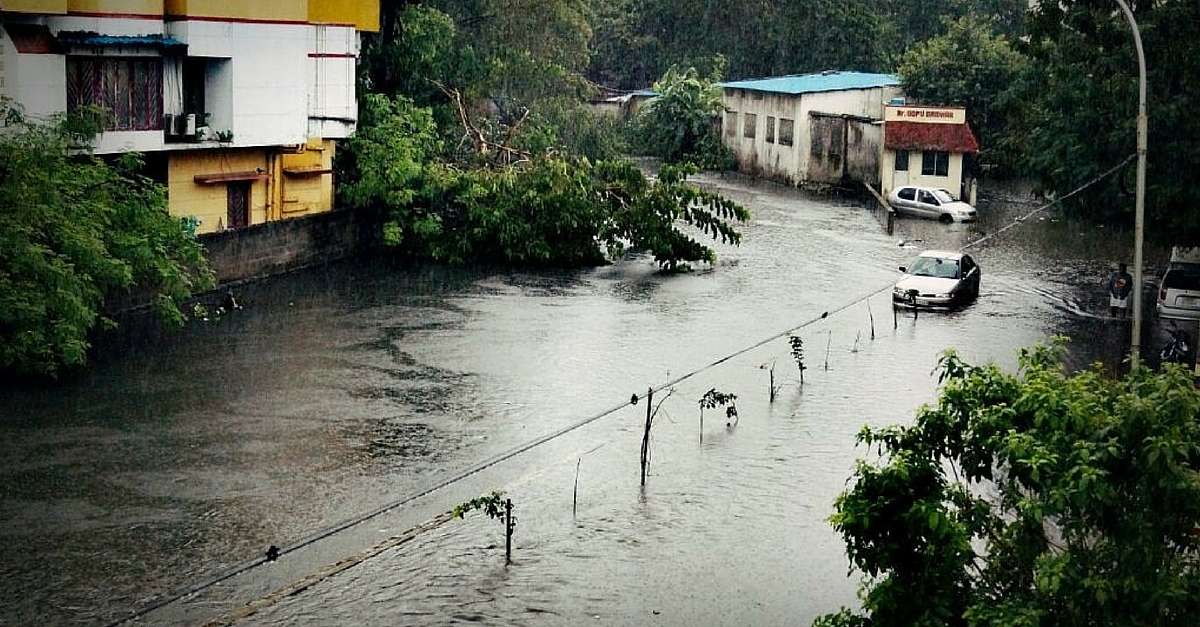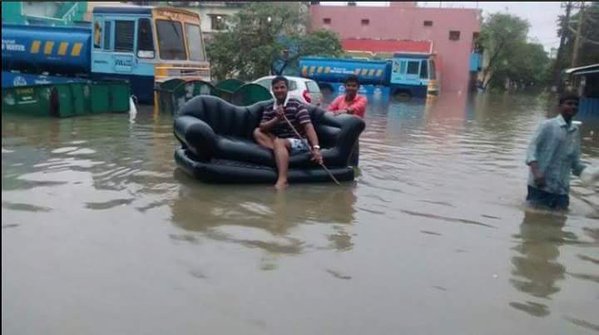Heavy rains over the past few days have battered Chennai and other parts of Tamil Nadu, killing almost 100 people, destroying crores worth of property and businesses, and stranding residents in flooded localities.
More rain is expected in the next 24 hours.
Photo Source: Twitter
Hari Balaji, consultant to the Government of India on disaster management, has some urgent advice that may help save lives during this calamitous event:
- Stay indoors as heavy downpours are expected.
- Stock up on necessary medicines for cold and fever and prescribed medicines (if any).
- Store enough water bubbletop cans, dry food, bread loaves, and snacks to last for a week.
- Have glucose and Electral packets handy.
- Have your cellphone battery charged to full (if possible get walkie talkies as there is possibility of signal shut down).
- Keep two torchlights with an extra set of batteries.
- Have three dozen candles and two packets of matchsticks handy.
- Get blankets and shawls for all family members.
- Put 3-4 camphor pellets in water cups and place them near windows and all corners of the room to avoid mosquitoes. A couple of cloves embedded in a half cut lime also works for chasing away mosquitoes. Dengue fever is caused by mosquitoes that come in the daylight.
- Keep a transistor radio with an extra set of batteries so you can listen to important announcements.
- Have all your important documents and valuables in one packet (easy to carry immediately).
- Have all emergency contact numbers written down in a pocketbook.
- Identify the best spot on your terrace/roof to climb up to if the water level increases, or the highest building in your area where you can go to till external assistance from Emergency Support Services arrives.
According to Balaji, officials from the departments of Revenue, Public Health, Police, Fire & Rescue, Local Bodies (Corporation/Municipality), Ambulance GVK EMRI, NGOs, are working relentlessly to bring the situation under control.
“But,” he says, “it is evident that human greed is the cause for this disaster crippling Chennai. If lakes and ponds were not transformed into concrete jungles we wouldn’t be facing this situation, that too for a mere average of 35 cm rain.”
The knowledge and expertise to handle disasters is available in India. “Our Health Secretary Shri Radhakrishnan and his team were invited to USA to share knowledge about handling a tsunami and it’s aftermath during US President Bill Clinton’s visit. We were able to bounce back after the tsunami with no epidemic outbreak. This shows that we have an excellent team of international standards in Tamil Nadu,” says Balaji.
Also, during the super cyclone (1990) in Odisha, more than 10,000 deaths occurred. But during Cyclone Phailin (2013), the number of deaths was 21. Awareness, pre-planning, and continuous training helped in the seamless execution of a disaster management plan. The United Nations awarded Navin Patnaik, Chief Minister of Odisha, for evacuating over a million people from the coastal area.
“Similarly, in Chennai, all Emergency Support Function Services worked in a cohesive manner and saved lives during the collapse of an 11-storey building that was under construction,” says Balaji.
Photo source: Twitter
He believes that a proactive approach rather than reactive approach is the key to disaster management. Regular training is the only way to combat natural disasters. Rigorous steps to avoid post disaster epidemic outbreaks have to be taken.
“This current situation is an eye opener and we must take a cue from this disaster. All waterbeds and drain channels should be repaired by the government and consistent co-operation from the public is crucial in maintaining them to avoid future dreadful consequences,” he concludes.
Balaji also has this appeal for all our readers:
Like this story? Or have something to share? Write to us: contact@thebetterindia.com, or connect with us on Facebook and Twitter (@thebetterindia).
If you found our stories insightful, informative, or even just enjoyable, we invite you to consider making a voluntary payment to support the work we do at The Better India. Your contribution helps us continue producing quality content that educates, inspires, and drives positive change.
Choose one of the payment options below for your contribution-
By paying for the stories you value, you directly contribute to sustaining our efforts focused on making a difference in the world. Together, let's ensure that impactful stories continue to be told and shared, enriching lives and communities alike.
Thank you for your support. Here are some frequently asked questions you might find helpful to know why you are contributing?


